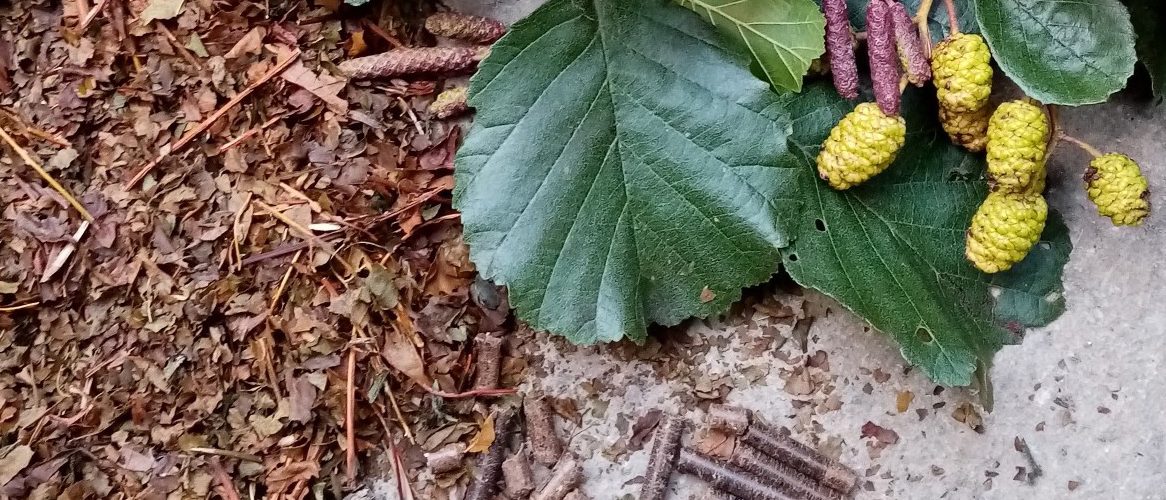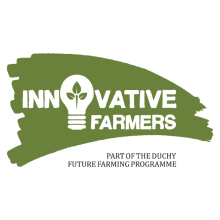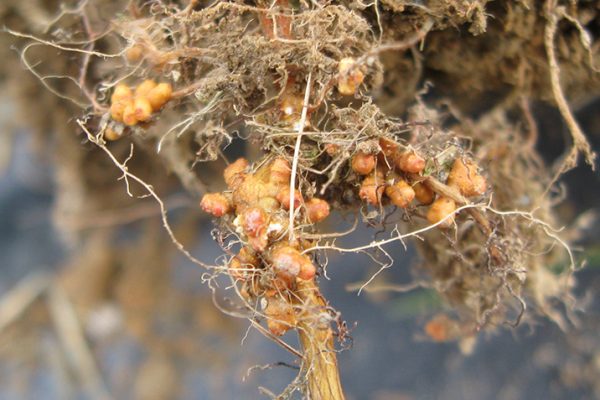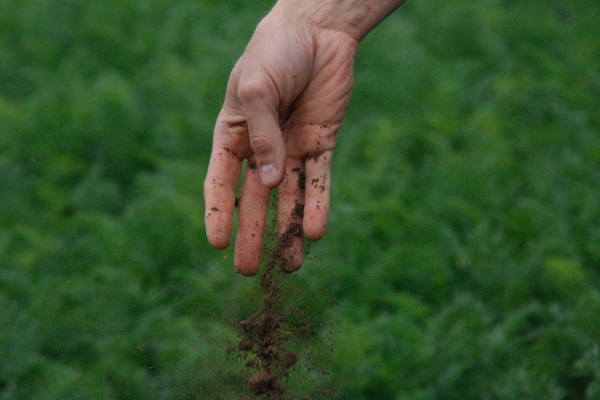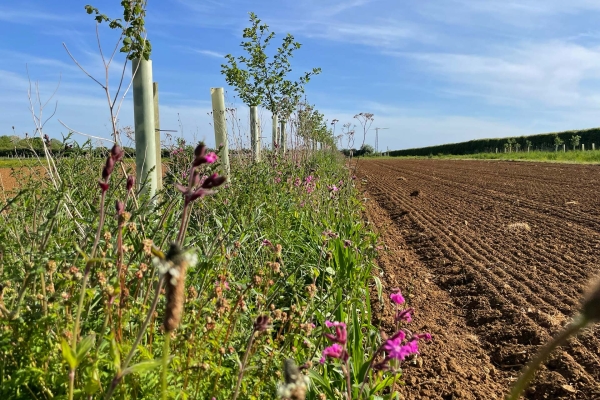Perennial Green Manures
Project Background
Perennial green manures are fertilisers made from plant material grown in biodiverse areas of coppice woodland and perennial plantings – a nitrogen producing agroforestry system. As with fertility-building clovers and vetches, nitrogen-fixing trees and shrubs such as alder trees and gorse bushes work with bacteria in the soil to convert nitrogen into a form useful to plants.
This project follows on from research that Clo Ward did for her PhD at Bangor University which began back in 2016. The concept evolved to solve ‘the nitrogen problem’ – the use of nitrogen fertilisers and animal manures has an environmental impact, but growing clover leys takes land out of production with losses of nitrogen after incorporation of the ley through tillage. Clo envisaged an alternative approach of growing trees and shrubs in permanent ‘bio-service’ areas and harvesting the leaves to fertilise the crops. The bio-service area, which could be on marginal land, can be multi-functional as windbreak, shelterbelt or buffer strip, and provide biodiversity benefits. She tested what she termed perennial mobile green manures (PMGMs) in pot, field and lab studies in comparison with ammonium nitrate fertiliser and red clover. Fertilisation by alder leaves, in particular, gave good yields with lower nitrous oxide emissions or risk of nitrate leaching than either red clover (used in the traditional way) or ammonium nitrate.
To see if such systems could work in real life, environmental group Ecodyfi in mid-Wales was awarded funding by the Co op Carbon Innovation Fund to work with local growers and farmers to trial perennial green manures in comparison to their usual method of fertilisation. The project began in summer 2022 and completes in spring 2024.
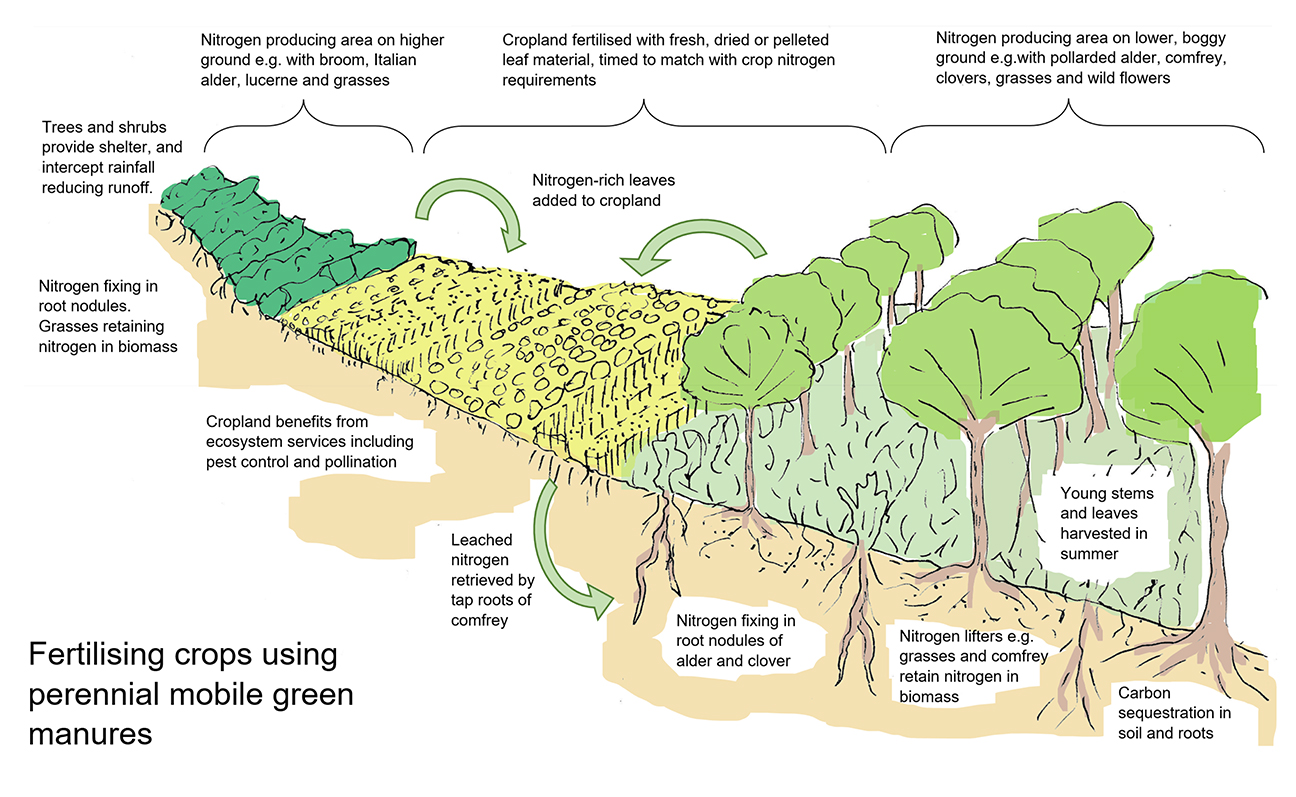
Aims & Approach
- Identify farmers and growers who wanted to use perennial green manures. Five sites were selected: Ruth Kernohan – Enfys Veg, Anne and John Owen – Einion’s Garden, Dan yr Onnen growers, The Centre for Alternative Technology and Emma Maxwell – Ash and Elm Horticulture.
- Testing practicalities of the concept and experience of growers. Bespoke trials were designed with the growers. Clo Ward said: “We got the growers to choose what crop they wanted to experiment on, and we chose perennial green manures that we thought would supply nutrients well into that crop. We usually used a mix; one slow release like alder, and one faster release like clover or comfrey, but adding just a little bit when the crops needed it so that we could fertilise the crops and not build up the nitrogen in the soil too much. We then compared it with our own additions.”
- Bioservice areas. In winter 2023/4, five growers (including three of the trialists) were funded to plant their own perennial green manures for future use as ‘bio-service areas’. These were designed and sited for maximum co-benefits to each farm, for example to act as shelter for crops, nectar sources for pollinators, and habitats for birds and insects which control crop pests.

Project outputs
Final reports
Insights from the Perennial Green Manures project: an innovative approach to fertilising cropland
Download the report summary in English
Download the report summary in Welsh
Download the full report in English only
Perennial green manures – an Innovative Farmers webinar (2024) This Innovative Farmers webinar provides an update on research into perennial green manures and opportunities to get involved in a field lab.
Listen: Fertilisers in the Landscape workshop at Oxford Real Farming Conference (2024) A discussion on using a whole landscape approach to soil fertility featuring Clo Ward.
Report: Perennial Green Manures and Plant Biosecurity (2023) A desk-based study commissioned by the project aimed at providing an insight into the potential pest threats that may be associated with PGM systems and the biosecurity measures that could be implemented to minimise pest risks.
Sustaining our soils: Getting the balance right Recording of an Organic Growers Alliance’s Organic Matters 22 conference session exploring stock-free organic standards and carbon sequestration, mobile green manures, Organic-PLUS trials on fertility-building inputs, grower experiences, and featuring discussions on research priorities.
Tackling the nitrogen problem – how best to manage this brilliant but volatile element? Article in The Organic Grower – No 60 Autumn 2022 by Clo Ward introducing the concept and the project.
Report: Production of pellets from dried clover & alder brash (2022) BEACON+ Collaborative R&D Project: EcoDyfi
Climate-wise Agriculture- how best to fertilise our crops? An article by Clo Ward in Clean Slate No 125 Autumn 2022 explores ‘the tricky issue of nitrogen in agriculture.’ It summarises the issues and Clo’s CAT-partnered PhD research into perennial mobile green manures.
Paper: Potential to improve nitrogen use efficiency (NUE) by use of perennial mobile green manures (Ward et al., 2022) Open access article in Nutrient Cycling in Agroecosystems. This paper concluded that PMGMs have potential to increase NUE over that of traditional green manures and discuss the feasibility and possible agro-ecological benefits of PMGM-fed systems.
Thesis: An evaluation of perennial mobile green manures for climate change mitigation in agriculture (Ward, 2020)
Clo Ward’s PhD concluded that PMGMs could improve nitrogen use efficiency and reduce nitrate leaching and nitrous oxide emissions compared to incorporation of clover, and have potential for a more favourable carbon balance than ammonium nitrate. Thus, PMGMs have strong potential for inclusion into a more sustainable agricultural landscape.
Innovative Farmers field lab
To get involved in the field lab on Perennial Green Manures, please contact info@innovativefarmers.org or complete this brief questionnaire.
